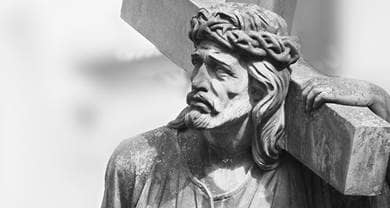- Trending:
- Olympics
- |
- Forgiveness
- |
- Resurrection
- |
- Joy
- |
- Afterlife
- |
- Trump

RELIGION LIBRARY
Christianity
Historical Perspectives
As with other religious traditions, there is diversity with respect to the ways in which the study of Christianity is approached. Much of this diversity can be observed by considering the way in which two variables in particular have shaped, and continue to shape, the study of Christianity: differing understandings of the natural and the supernatural, and differing theological and ecclesiastical commitments or "locations."
Before turning to these two variables, however, two general observations should be made. First, these differences of understanding and "location" are not simply differences with respect to the study of Christianity, but in some cases represent differences of belief with regard to the substance of Christianity itself. For good or ill, acknowledged or not, scholars' beliefs about Christianity do, to some degree, shape their approach to the study of Christianity.
| Albert Outler's approaches to the study of the history of Christianity | |
| Classical Consciousness | Christianity and the church are seen as one and the same |
| Historical Consciousness | the need for objectivity and a scientific approach is acknowledged, but too narrowly applied |
| Ecumenical Consciousness | ecclesiastical and theological diversity is acknowledged |
| Global Consciousness | perspectives of women, the poor, and those outside of Europe and the Americas are considered |
Second, the study of the history of Christianity is often marked by a distinction between beliefs (what Christians believe, teach, and confess) and phenomena (what Christians do and the "culture" or sub-culture they create). Study of the former is usually referred to as historical theology or the history of Christian thought or the history of Christian doctrine. The latter is often referred to as Church history, and includes attention to people, events, and institutions. These two—beliefs and phenomena—are distinct, yet obviously closely inter-related. (Some scholars would suggest that they are so closely related that a distinction cannot be made and should not be attempted.) Consequently, in recent years the historical context of ideas and beliefs has been taken more seriously in historical theology, and the significance of belief has been taken more seriously by some Church historians.
With these two general observations made, we turn to the two variables identified in the opening paragraph above. One variable is differing understandings of the relationship between the natural and the supernatural. Historians of Christianity have long debated such questions as whether or not they should attempt to discern how God has worked directly and supernaturally in the history of Christianity. Scholars, including both "secular" and "religious" scholars, hold varying views regarding God's providence, that is, God's sovereign oversight of and involvement in history.
If an historian is of the view that God does not work directly or intervene supernaturally in history (this is, of course, a theological view, whether acknowledged by the historian or not), then, of course, certain historical questions—such as whether or not it is possible to identify God's work in history—is a moot point. And, in this case, the story of Christianity, past and present, will be told exclusively with respect to non-supernatural factors, such as economics, sociology, technology, culture, and the like. Such an historian has already concluded that there is no such divine working to (even potentially) study.
If an historian is of the (theological) view that God does indeed work providentially in history, then the question still remains as to whether or not it is possible, and whether or not it is advisable, to attempt to discern such workings in history. And, scholars draw different conclusions regarding these questions. Some, believing that God does work providentially in history, believe that historians can and should attempt to tell the story of Christianity in a way that includes "acts of God" in history.
Other historians, including some who also hold the belief that God works providentially in history, believe that, due to the nature of history and the historical enterprise, historians are simply incapable of identifying such divine operations as divine, providential workings of God. According to these scholars, historians-as-historians cannot and should not attempt to make statements about God's providential working in history. Thus, functionally, these latter scholars approach the study of Christianity in much the same way as those who hold different (theological) beliefs about God's providential working. Both these historians and those who do not believe that God does work providentially in history (see preceding paragraph) will tell the story of Christianity exclusively with respect to "non-supernatural" factors, such as economics, sociology, technology, culture, and the like, not including any explicit appeal or reference to divine sovereignty.
Obviously, differing understandings of this matter—the relationship between the natural and supernatural in history—will generate different approaches to, questions about, and conclusions regarding both the historical past and the historical present of Christianity.
A second variable in the study of Christianity consists in theological and ecclesiastical commitments, or the "location" from which Christianity is viewed and analyzed. Simply put, this is a matter of perspective. The theological commitments (or lack thereof) and the ecclesiastical or Church-related commitments (or lack thereof) of a scholar will, to some degree, influence the way that Christianity is interpreted. This is clearly observable in the history of the study of the history of Christianity. Adapting and expanding terminology used by the Methodist scholar Albert Outler, at least four approaches to the study of the history of Christianity can be identified.
In what can be called the "classical consciousness," Christianity and the Church are seen in essentially monolithic terms. The diversity of Christianity is not adequately recognized, and the task of history is largely to tell the story of the "one true Church" as perceived by the person or group telling or writing the history. This approach often emphasized the affirmation of "orthodoxy" and the denigration of "heresy."
Beginning in the Renaissance an "historical consciousness" started to emerge. This "historical" approach was greatly intensified during the Enlightenment and again in the 19th century. This approach affirmed, at least in principle, the need for "objectivity" and a "scientific" approach to Christianity and its past. Despite these commitments, however, the history which was produced, like that of the classical consciousness, often seemed to narrowly reflect the specific agenda of the persons writing it.
By the end of the 19th century a new consciousness, an "ecumenical consciousness," began to manifest itself. Here there is a greater awareness and acknowledgement of the long-standing ecclesiastical and theological diversities of Christianity, while at the same time a desire also to acknowledge the unity that is shared among the many traditions of Christianity.
More recently, the study of Christianity has been marked by a global consciousness, with at least three dimensions. In recent decades there has been increased study of and appreciation for voices within Christianity that too often have not been heard—the voices of women, persons of color, and the poor. In addition to this and more recently, there has been increased study of and appreciation for Christianity in the "two-thirds" of the world beyond the Euro-American arena. And, with this has also come increased attention to the relationships between Christianity and world religions. Thus, the study of Christianity is currently marked by a dramatic expansion of perspectives and scope.
Study Questions:
1. Describe the relationship between Christian beliefs and Christian practices. Why are the two in tension?
2. How does the position of the historian or scholar affect the interpretation of Christianity?
3. What is meant by classical, historical, and ecumenical consciousness?
4. How is the study of contemporary Christianity influenced by those outside of it?










